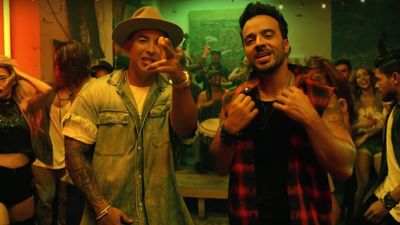How 'Despacito' Became the Most Played Song In Nigeria
"Despacito" is the most played song in Nigeria, 3 weeks in a row and running. We talk to Pulse Nigeria's Head of Music about the reasons why.
The craze that is “Despacito” has caught on in Nigeria where it is currently the most played song on radio stations, according to records compiled by My Play Data. The single's remained at the #1 spot for 3 weeks in a row.
Luis Fonsi’s hit featuring Daddy Yankee is, on aggregate across media platforms, now the most streamed song ever, clocking nearly 5 billions streams.
The song’s popularity in the US and other Anglophone markets it often feeds is a result of the Justin Bieber feature, though the song was already a monster hit in the Latin pop sphere.
Even more incredible is that this version of Fonsi’s song is largely in Spanish, and yet has done so well in the US and is now doing so well in Nigeria.
To further understand why “Despacito” has caught on in Nigeria today, where little to no Spanish is spoken, and especially when afrobeats is at its most confident as a genre, I spoke with Joey Akan, Head of Music at Pulse Nigeria and host of a pop culture podcast, along with Segun Akande and Abiola Solanke, called The Sound.

I ask what about “Despacito” makes it a people’s favourite. “Everybody can vibe to it,” says Akan miming the dembow percussion prominent in reggaeton “from the man in Abia state to the man in Zurich. Once you hear that sound, that rhythm, that bounce, you gotta move to it.”
Akan mentions Duncan Mighty as one of few Nigerian artist who have incorporated Latin arrangements to their music.
Dembow was dominant in afrobeats until recent shifts in tastes to calmer production as found on Tekno’s “Pana”, Runtown’s “Mad Over You” and Davido’s “If.”
With this in mind, the popularity of Fonsi’s “Despacito” confounds. Akan believes a reason for this may be that in Nigeria “we’re lacking in new music breaking out,” pointing to the absence of any new and exciting pop acts making a mark this year.

The popularity of “Despacito” could be attributed not only to how embedded in afrobeats the dembow arrangement is, but also the inculcation of Jamaican dancehall into afrobeats in the '90s.
Blacky and Ras Kimono were some of the earliest adopters of reggae in Nigeria. The generation after referred to their own interpretation as dancehall in the '90s to coincide with the rise of Patra, Chaka Demus & Pliers and Shabba Ranks whose songs relied heavily on the dembow and were hugely influential in Nigerian pop.
The dembow was primary to '90s hits as in “Dem Go Dey Pose” by Baba Fryo and “Diana” by Daddy Showkey. This was also true for noughties monster hits like “Danfo Driver” by Mad Melon and Black Mountain. It can be heard in its nakedly '90s form—which has persisted in reggaeton—on more recent songs as on “Bend Down Pause” by Runtown and Wizkid.
It’s a simple case of trends and adoption which when retooled by Nigerian artists morphed into what today is known as 'galala.' This, in origin and proliferation, is very possibly how reggaeton took root in Latin countries, whose populations of African origins are the largest outside of the continent.

The several iterations of “Despacito” include the original Latin pop version by Fonsi and Daddy Yankee, a club mix, a Major Lazer & MOKSA remix and many others to come surely. The remix with Justin Bieber that is breaking records of all sorts is the same one most requested on Nigerian pop radio.
I ask Akan if these other versions would be as loved as the one with Bieber on it. He doubts this would happen, also adding that “some people don’t even know it’s a remix.”
Not that most would care. “Despacito” was the most requested song from colleagues at a recent football game, held in Lagos, between departments at Akan’s office.
Akan was the DJ and he tells of how he delayed playing the hit song “until towards the end, and when i rolled the song out, everyone screamed, danced and sang along.”
